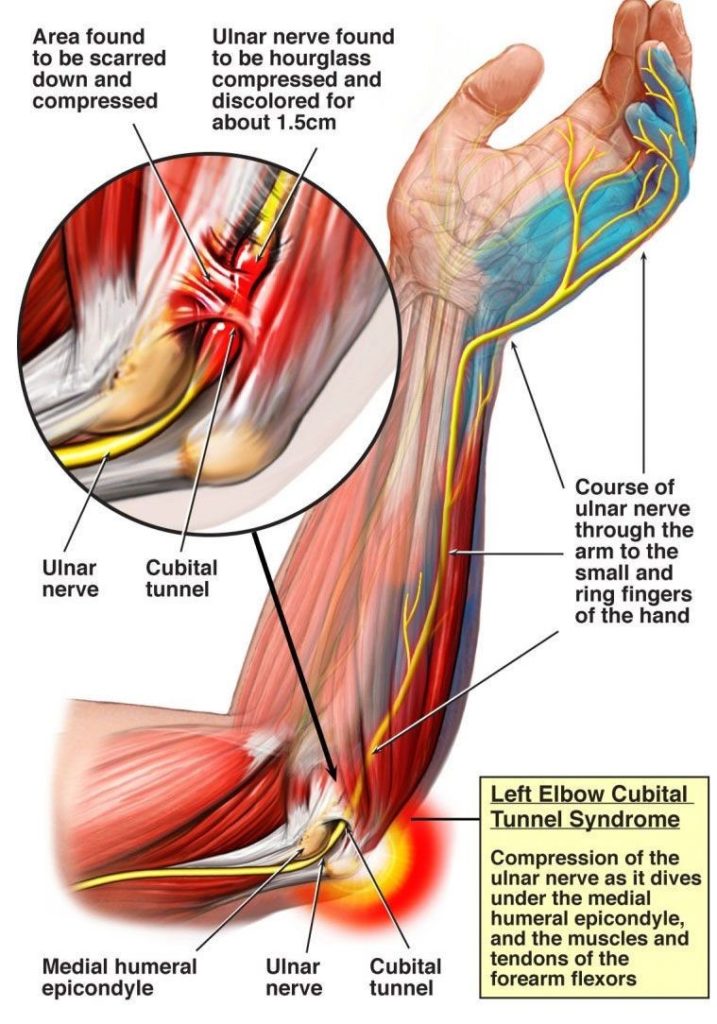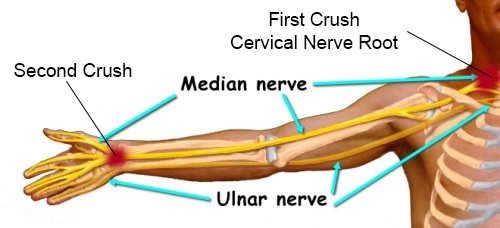- GET CORRECTLY DIAGNOSED NOW - WORLD CLASS EMG TESTING
- 312-877-0035
EMG Best Test To Diagnose Cubital Tunnel
Best Test for Cubital Tunnel is the EMG/NCV Nerve Test
Exams and Tests for Cubital Tunnel Symptoms
How Your Doctor Properly Diagnoses Cubital Tunnel

Diagnosing Cubital Tunnel
To diagnose Cubital Tunnel correctly and develop a list of possible causes, an EMG/NCV (Electromyography/Nerve Conduction Velocity Study) is the most accurate and correct test and is required to confirm your diagnosis. The EMG Test measures:
1) Your nerve speed
2) Amount of electricity moving through the nerve
3) Reaction time of the nerve to stimulus
4) Overall pattern of peripheral nervous system function
What Common Symptoms of Cubital Tunnel?
What Common Symptoms of Cubital Tunnel?
There are several conditions that may cause elbow, hand and forearm pain and numbness.
Cubital Tunnel Syndrome: Symptoms and Causes
Cubital tunnel syndrome -- also known as ulnar neuropathy -- is caused by increased pressure on the ulnar nerve, which passes close to the skin's surface in the area of the elbow commonly known as the "funny bone."Baseball pitchers, for example, have an increased risk of cubital tunnel syndrome, because the twisting motion required to throw a slider can damage delicate ligaments in the elbow. In many cases of cubital tunnel syndrome, the exact cause is not known. The ulnar nerve is especially vulnerable to compression at the elbow because it must travel through a narrow space with very little soft tissue to protect it.
There are several things that can cause pressure on the nerve at the elbow:
- Repeatedly lean on your elbow, especially on a hard surface
- Bend your elbow for sustained periods, such as while talking on a cell phone or sleeping with your hand crooked under your pillow. This can aggravate symptoms of ulnar nerve compression and cause you to wake up at night with your fingers asleep.
- In some people, the nerve slides out from behind the medial epicondyle when the elbow is bent. Over time, this sliding back and forth may irritate the nerve.
- Fluid buildup in the elbow can cause swelling that may compress the nerve.
- A direct blow to the inside of the elbow can cause pain, electric shock sensation, and numbness in the little and ring fingers. This is commonly called "hitting your funny bone."
Risk Factors
Some factors put you more at risk for developing cubital tunnel syndrome. These include:
- Prior fracture or dislocations of the elbow
- Bone spurs/ arthritis of the elbow
- Swelling of the elbow joint
- Cysts near the elbow joint
- Repetitive or prolonged activities that require the elbow to be bent or flexed
- If the nerve is very compressed or has been compressed for a long time, muscle wasting in the hand can occur. Once this happens, muscle wasting cannot be reversed. For this reason, it is important to see your doctor if symptoms are severe or if they are less severe but have been present for more than 6 weeks.
The Symptoms of Cubital Tunnel Syndrome

If you have any of these symptoms, your doctor may be able to initially rule in the diagnosis of cubital tunnel syndrome by physical exam and send you for an NCV/EMG (Nerve Conduction Velocity and Electromyography) for confirmation. Combined, this nerve conduction test is a procedure in which electrodes placed onto muscles and on the skin measure the health of muscles and the nerve cells that control them, to confirm the diagnosis, identify the area of nerve damage, and determine the severity of the condition.
Early symptoms of cubital tunnel syndrome include:
- Pain and numbness in the elbow
- Tingling, especially in the ring and little fingers
More severe symptoms of cubital tunnel syndrome include:
- Decreased overall hand grip
- Deep ache and pain that radiates from the elbow to the middle, ring and pinky fingers
- Weakness affecting the ring and little fingers
- Decreased ability to pinch the thumb and little finger
- Muscle wasting in the hand
- Claw-like deformity of the hand
Do not wait too long after you notice regular symptoms to schedule your EMG NCV Test. If you do you are prolonging your condition, delaying correct and accurate diagnosis and allowing scar tissue to build up. If you have an undiagnosed compression syndrome further trauma to the nerve can cause more permanent disability if the nerve compression goes undiagnosed and excessive scarring develops.
GET RELIEF FROM CUBITAL TUNNEL NOW
(312) 877-0035
Fast & Convenient
Expert EMG Neurological Diagnostic Tests - Same Day Testing Available! We ALSO Document work & Personal Injuries for legal cases as well. We have FOUR locations to serve you.
